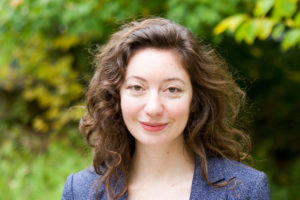This is the second post in a series of interviews conducted by the Woodruff Library with the 2019-2020 Emory Libraries/Emory Center for Digital Scholarship (ECDS) Fellows. Funded by the Laney Graduate School, the library and ECDS award fellowships to advanced graduate students expecting to complete their dissertations by the end of the fellowship period. Fellows are placed within the Woodruff Library, Rose Library and ECDS to work in an area related to their subject specialization or interest, culminating in a formal presentation in the spring.
Tell us a little bit about yourself. Where are you from? What’s your favorite book? What’s your favorite thing about Emory/Atlanta?
I’m originally from the Bay Area in Northern California, but I lived in New York for eight years before moving to Atlanta–so I grew up moving very slowly, sped up it up really fast for a while, and now really enjoy the pace of living in Atlanta. My favorite book is Octavia Butler’s Lilith’s Brood, but also I always miss Elena Ferrante’s novels when I’m not reading them. My favorite thing about Atlanta is the dance scene.
What are you researching for your dissertation?
My research connects contemporary environmental philosophy to aesthetic questions about the experience of nature. In the dissertation, Figurations of Nature in Kant and Adorno, I propose that 1) a nuanced account of nature is necessary for the sake of ecological political action, and 2) that attention to the aesthetic function of nature has to be a part of this account. I draw out the ethical and political consequences of different definitions of the term “nature” within the context of environmental philosophy, as well as in the conception and experience of natural beauty. Drawing on both Kant and Adorno, I reconstruct an account of the aesthetic experience of nature that is appropriate to our historical moment of global climate change, where it is increasingly difficult to define nature as that which is independent of human activity.
What interested you about the Woodruff Library Fellowship?
I was interested in the Woodruff Library Fellowship because it allows me to work as a tutor with both undergrad and graduate students on their writing assignments, and it lets me focus on building a supportive environment where graduate students can tackle their dissertations in the company of others. I get to zoom in on individual writers and their projects, and I get to zoom out to try to make writing a positive part of graduate students’ busy lives.
What will you be working on this year for your Woodruff Library Fellowship?
Besides running Dissertation Boot Camps and tutoring in the Writing Center, I’m working on sharing these resources with other writing groups that are emerging on campus. I’m also trying to convince graduate students on an individual basis that they should make use of these spaces and support while they are still on campus.

